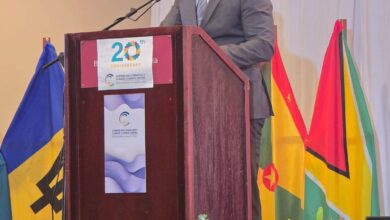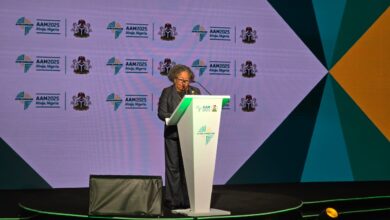CARICOM Secretary-General, Ambassador Irwin LaRcoque, delivering the Feature Address on the occasion of Public Service Day, 2 December 2016, in the Commonwealth of Dominica:
It is a real pleasure for me to be here tonight to celebrate with you as you acknowledge and reward your peers for excellence and service. I congratulate all the awardees who I am sure would have put in the extra effort to ensure that the job was done. There is nothing more satisfying than the feeling of a job well done – except of course being rewarded for it!
That feeling was probably never more satisfying than your performance following the passage of Tropical Storm Erika.
Indeed, it moved the Honourable Prime Minister to say in his budget statement: “the performance of most of our public officers has been exemplary. They have shown us and the public, especially those affected by Erika, their true mettle. No day was too long, no task too difficult, no sacrifice too impossible, as they worked tirelessly to bring comfort and security to those suffering from loss, and to restore some measure of normalcy to life in the country”.
That was in your finest tradition and epitomised the meaning of the words public service.
It was here in Dominica that I learnt and understood the meaning of those words, working with people such as Vernon Shaw, Alick Lazare, Julian Johnson, Eliud Williams, Jennifer Astaphan, Emaline Elwin, Colin Bully, Mayna Scotland-Andrew, and Charles Maynard.
I served as Permanent Secretary with Mr. Maynard when he was a Minister as I did with His Excellency President Savarin when he was a Minister.
I wish to express my appreciation to all of those stalwarts for their inspiration. And, may I take this opportunity to thank you for the award in recognition of my contribution to the public service, bestowed upon me in 2014, which I was unable to receive in person at that time.
As government employees entrusted with the administration of the service to the country, and mandated to carry out the policy of the government of the day, the twin virtues of professionalism and integrity are the core values that underpin the approach of a public servant to the task at hand. It is no exaggeration to say that a nation stands and falls by the professionalism and integrity of its public service. The primary role of the public service is to work for the success of the government of the day, within the confines of the constitution, the laws and the rules and regulations of the service.
Those twin virtues must remain the bedrock of your performance. That approach of professionalism and integrity is all the more important, given that the world in which we live today, demands that we adapt and change in order to ensure that we deliver our services to the public, in a manner that is expected and deserved. This delivery is in an environment of expectation of instant gratification, which calls upon us to be managers of that expectation, even as we seek to satisfy the public that we are conducting their business in a timely and efficient manner.
To achieve that happy medium has been the driving force behind the efforts at public sector reform. All of our CARICOM Member States have been focussed on public service reform in differing degrees over the years. Indeed, I recall my involvement in such an exercise, here in Dominica, in the late 1980s and into the 90s.
The real task, as one of the foremost thinkers on the issue, the late Gordon Draper of Trinidad and Tobago put it, is “how do we achieve real and lasting changes in the management of the ‘people's business’”? For there is no doubt that a viable and dynamic process for the management of change and the reform of public services, can provide meaningful benefits to our citizens.
The development of a more people-centred approach to service is critical to all reform efforts, as the days of the public service being a reactive bureaucracy are over.
We must be customer oriented. Today’s public servant must understand and appreciate that the complex and inter-connected world in which we live requires flexibility and resilience in thinking and action. This will enable duties to be performed in a responsive way while being innovative, in order to increase effectiveness and efficiency. In that regard, the increased use of modern technology has become a key factor.
Ladies and Gentlemen, the characteristics that define the modern public service apply to those performing such duties at both the national and the regional levels. Having served in both capacities, I can attest to that fact. Further, it is imperative for the advancement of our integration movement that the national and the regional have a symbiotic relationship at the administrative level. This cohesion will make a massive difference in delivering the goods and services that will improve the lives of our people. It is a critical element as we seek to change the way we do business in our Caribbean Community.
As I view it, the theme for your celebrations ‘Embracing the Challenge: Rethink, Rebuild and Transform’ therefore, has resonance, both as a reaction to the passage of Erika as well as to the idea of reform. The three stages identified capture the conception, the action, and the end result of the reconstruction, and of any reform process. The first phrase, “embracing the challenge”, singles out the most difficult part of undertaking that mammoth exercise, as well as initiating any form of change.
Reform is never easy. Side by side with the undertaking of any reform process, is the management of the change that it is seeking to bring about. It calls for those entrusted with the task to be sensitive to the concerns and fears that going from the known to the unknown bring. It requires the acceptance of new ideas, of new ways of doing things and, at a personal level, of critical self-examination. As difficult and challenging as reform is, it is absolutely essential in order to confront the ever-changing nature of today’s global environment.
The recognition of that reality is what is driving me as I undertake the current reform process in our Community. This reform is not an end in itself but a means of ensuring that the citizens of CARICOM derive the maximum benefit from our integration process.
When I took office in 2011, I stated that I was “firmly of the view that the architecture and governance of our integration arrangements must be reformed if we are to be more effective and accountable”. To achieve this, I further stated that we could not proceed with business as usual.
I spoke then against the backdrop of the Heads of Government decision, in 2010, to commission an independent review of the CARICOM Secretariat. The recommendations of that review included a three-step approach to CARICOM’s reform and restructuring process:
(i) prioritisation and the delivery of a narrow range of specific, practical and achievable benefits over a reasonably short time horizon;
(ii) re-organisation and strengthening of the CARICOM construct, including the Secretariat and Regional Institutions, to focus on the management of implementation; and
(iii) a fundamental restructuring of the Secretariat to add value to what Member States can do individually.
As a result of that review, in 2012, the Heads of Government decided that since ‘form follows function’, it was necessary to re-examine the future direction of the Community and the arrangements for carrying this forward, including making the Secretariat fit for purpose.
The Heads of Government also identified the importance of prioritisation, given the limited human and financial resources available to the Community. It was recognised that we needed a cohesive vision for the Community, to help in that regard. This was achieved through designing the first ever Community Strategic Plan for the period 2015-2019. For the first time in the 43-year history of CARICOM, we have a Strategic Plan to guide the way forward.
The Plan requires the active involvement of our Member States, and by extension their public servants, along with the Institutions and the Secretariat, as Implementing Partners. It demands a new cohesive approach to achieving the goals of our Community.
We have made progress in operationalising that Plan and we appreciate the high level of cooperation that we have received thus far from the other Implementing Partners.
Instrumental to the entire process, and indeed to the reform’s success, is the CARICOM Committee of Ambassadors, a key body in the evolving governance arrangements of the Community. Each Ambassador is selected by the Head of Government and acts to facilitate engagement within the relevant Member States. They provide the vital link between the regional and the national.
They identify the individuals and the groups who we need to engage on specific issues. The Ambassadors, in their role as Change Drivers, were essential in co-ordinating the consultations which were conducted for the Community Strategic Plan, and will play a large role in addressing blocks or challenges in the implementation of regional programmes, policies and projects within each Member State.
In Dominica, that task falls to Ambassador Felix Gregoire, the current Chair of the Committee of Ambassadors, who achieved the highest rank in the Dominica Public Service as Cabinet Secretary, prior to his retirement.
In light of the complexity of the envisaged changes to the Secretariat and CARICOM as whole, I established a Change Management Office, within my office, to assist me in delivering “a restructured Secretariat with strategic focus and strengthened corporate functions”.
A Strategic Business Plan is being crafted to ensure that the activities of the Secretariat are aligned to the Community Strategic Plan and to enable the Secretariat to deliver its ‘regional public goods’ to the right standard, at the right time, and in the right way.
You may wonder why a “Business Plan” for a public sector organisation. Recall that when I became Secretary-General, I stated that it cannot be business as usual.
The Business Plan seeks to strengthen customer/stakeholder relationships; improve programme outcomes; and improve both programme and project quality. It will guide us on how to do things differently, to become more effective and efficient. It will guide us on how to work smarter.
The Business Plan is a critical output for the Secretariat to establish and communicate to management and staff, clear strategic priorities in the context of the available resources, the large number of activities which must take place as part of the Reform, and the priorities outlined within the Strategic Plan.
The discussions taking place, during the development of the Business Plan, have allowed the staff to revisit fundamental concepts that were taken for granted. For example: Why does the Secretariat exist? What are the external and internal factors impacting the organisation? What must we do to remain viable and to be successful in our mission?
Changing the way the Secretariat operates, necessitates an organisation-wide initiative with no office, directorate, unit, team or individual left untouched. Every role, process, policy and strategy must be interrogated, reconsidered and reviewed.
A job analysis of the executive and senior management, including myself, has been conducted in addition to a ‘work style’ assessment. It also interrogated the time management practices with regard to its allocation for the strategic, technical, advocacy and administrative duties of the executive and senior managers. Are we spending the right amount of time on the things that really matter? It points to the need for executive and senior managers to be more strategic in the execution of their duties.
We are going to conduct a Business Process Review for every aspect of the working procedures of the Secretariat.
Are we too bureaucratic in how we do things?
Can we do things with less steps and better results?
Or, put conversely, what is the most efficient and effective way to achieve the desired results. It will look at the nuts and bolts of how we do business in the Secretariat.
The business process review will also identify specific changes needed for each role and function.
This will help to hone the efficiency and effectiveness of the Secretariat, while recognising that elements of the organisation’s role will change, as CARICOM continues to evolve.
With all the systemic changes being undertaken, just as important is the attention that must be paid to the people being affected by this change, the staff. They are the ones who will make the process successful and sustained. They must first understand and agree to the need for change which would allow them to embrace it and be willing to accept a transformation of how they interact and how they go about their duties.
In other words, there must be a willingness to change the culture in the work place in order to fully achieve the goals of reform. Without this human element in place, no reform can be successful.
We will also be looking at the decision-making processes in the Community and ask similar questions about our Organs and Bodies. I am referring here to the Conference of Heads of Government, the Ministerial Councils, the Legal Affairs Committee and the Committee of Ambassadors. The Secretariat must guide the process of making the Councils more strategic.
I am the first to admit that the agendas of these Councils are much too long, and that items remain on the agenda for much too long as well. The Secretariat, for its part, must bring matters to the attention of the Ministers that are ripe for decision-making or require strategic direction. We must be thoroughly prepared.
But equally true, the Organs and Bodies are made up of representatives of Member States, and they must play their role in getting items successfully off the agenda. It is the Member States who must implement and the officials who attend these meetings and who help to prepare for the Council Meetings, must be better prepared.
You would recognise from what I have said, that the public service in Member States is a key stakeholder and partner in what we in the Community are trying to achieve, for the benefit of the people we serve. There must be an understanding of inter-sectoral linkages and how that serves to improve the level of preparation for decision making, at both national and regional levels.
Another leg of the reform process is a review of the CARICOM Institutions, of which there are 16. This will entail reviewing their function and performance and whether they are fit for purpose. We need to avoid duplication of effort between the Secretariat and the Institutions and among the Institutions themselves.
Eventually I would like to see the Secretariat and the Institutions create a regional public service in the interest of our Member States.
But how would we know if we are making progress?
An important aspect of the governance arrangements is monitoring and evaluation of our progress. With the help of funding from the Caribbean Development Bank (CDB), we are currently implementing a two-year project to design a monitoring and evaluation system for the Community, which will include performance scorecards. Our intent is to ensure that we use an evidence-based approach that will focus on results, and allow us to track the progress of integration and the specific programme and project outcomes which the Secretariat, each Member State and each Institution provide. We must be accountable
Ladies and Gentlemen, this reform process is an extremely involved one. What we have embarked on involves changes in the conduct of business at all levels of our integration architecture.
The change that we are undertaking cannot be cosmetic where we tinker here and there or adjust a few processes.
The effect must be sustained and sustainable and provide the viable, safe and prosperous Community for All.
It is my expectation that this process of reform would be significantly advanced during my term as Secretary-General, ensuring that our CARICOM construct and architecture would be much more efficient and effective, in serving the interests of our people and delivering to them the real benefits of integration.
I cannot do it alone. The Secretariat cannot do it alone. We need you on board with us.
With your help, we would have embraced the challenge and transformed our Community.
I thank you.






